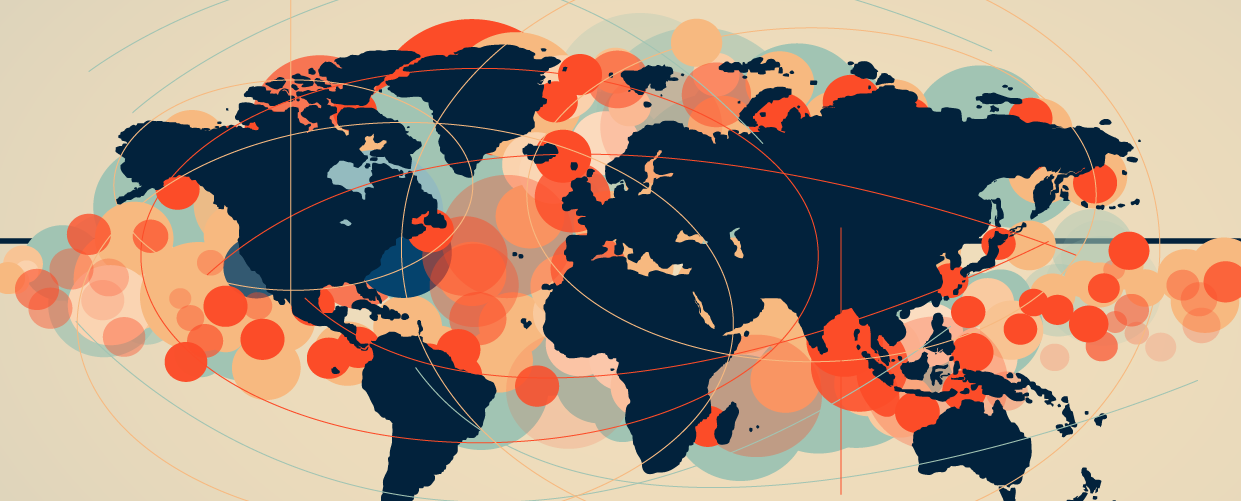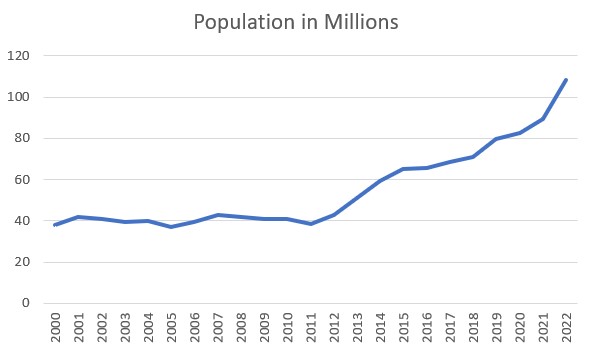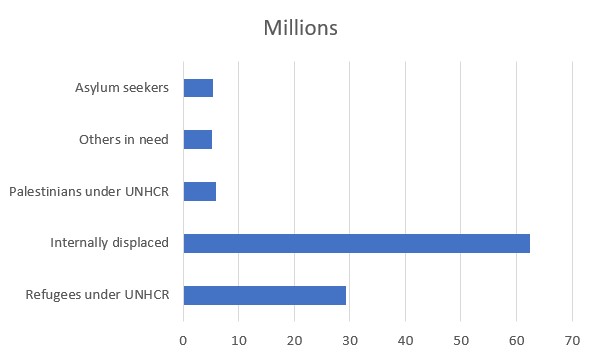A Brief History of Globalization and Its Setbacks
All empires before 1500 were land-based and regional. They were usually comprised of contiguous lands conquered by armies marching on foot or riding horses. The greatest of these were those of Rome and China, and then the Muslim Caliphates and the Mongolians. The only link between these land-based empires was the 6,400 km-long Silk Road trade route that relied on camels and horses.
True globalization could never happen without mastery of the 70 percent of the globe’s surface that is covered by sea, and controlling the sea could only be attained by accurate mapping, achieved by developing sturdy naval ships with navigational tools to measure latitude and longitude. Only then could global empires span continents.
The Chinese attempted this in the early 15th century[1], and Spain and Portugal created the first of these empires in the 16th century—but the objectives were more for plunder and fame. Then came the trading empires of the Dutch, British, and others. During the latter part of the 18th century, the British navy’s influence expanded across the world, culminating in the defeat of the combined French and Spanish fleet at the Battle of Trafalgar in 1805. Britain then dominated the world’s oceans, imposing a de facto ‘Pax Britannica’ that lasted until 1943.
The British sea captain James Cook’s three voyages of exploration and development of accurate charts laid the basis for the globalization of trade and communications and then fuelled the Industrial Revolution. This, combined with the moral and spiritual impact of the 18th century Evangelical Revival (also called the First Great Awakening), provided the impetus for the ending of the slave trade and paved the way for the modern missions movement to flourish.
The climax of globalization came after the two devastating World Wars and when the US was established as a dominant superpower. The reconstruction period from 1945 onwards, the setting up of a viable networking body with the United Nations, and the newly established set of trade rules undergirded by a huge US naval fleet ensured reasonably safe trade. One could call this a ‘Pax Americana’. Its peak came after the collapse of the USSR Marxist/Russian Empire in 1981.
The pivotal point of the ending of over two centuries of globalization was the ‘9/11’ Islamist terror attack in New York. Since then, we have experienced setbacks that have broken down the structures that sustained globalization. What were these setbacks?
- The Western military and political response to 9/11 and Islamic jihad in Afghanistan, Iraq, Libya, and elsewhere were ultimately disastrous failures. It left Iraq in chaos and Libya in civil war, and left a running sore of insurgency in surrounding Sahel states. It led to Afghanistan reverting to Taliban rule. These failures discouraged the US from continuing to act as the world’s ‘policeman’, soured Westerners to globalization, discredited the whole concept of democracy, and empowered the rise of autocratic and populist leaders. It has also negatively impacted missions and their ministries.
- The ripple effects of Russia’s invasion of Ukraine have destabilized the whole world. It has disrupted the availability of many basic commodities such as foods, grains, oil, gas, neon gas, fertilizers, etc. Multiple nations face economic collapse, famines, and violent social upheavals as a result. It has diverted a huge proportion of the world’s wealth away from dealing with poverty, refugees, and climate change.
- The impact of the COVID-19 pandemic has devastated trade, economies, and cultures; accelerated trends toward regionalization; shortened industrial supply chains; hastened population implosions; and changed social and work patterns as well as the way churches operate. The injection of massive funding into the pandemic crisis and world re-armament has led to the enrichment of the often corrupt elite at the expense of straitened middle classes and the further impoverishment of the poor. The increase in indebtedness of most nations is staggering.
- The climate crisis looms over all, with many predicting catastrophic ocean rises, raised temperatures, water wars, famines, massive migrations, and so on.
- The developing population collapse in most parts of the world is paralleled with the fact that the only countries with continued population growth are the ones most affected by the above setbacks, and most are majority Muslim—Pakistan, Egypt, Niger, Mali, etc. The increasing population collapses in Russia, Europe, South Korea, China, etc. could cause social and political structures to collapse in the coming decades. The way churches and agencies operate will need to change if they are to survive.
- The worsening migrant crisis. UN statistics show that the number of those forcibly displaced has steadily increased from 42 million in 2012 to 108 million in June 2023. This does not include all the many economic migrants to cities and to other countries. We can expect this to continue to increase over the coming decades—and must prepare for it. Note the recent graphic of the UNHCR, which shows the increased displacement of populations and the desperate lack of funding[2].
The Globalization of Christianity
It was Captain Cook’s account of his voyages of exploration that inspired William Carey to write his book, An Enquiry into the Obligations of Christians to Use Means for the Conversion of the Heathens[3]. Carey also gave the first estimate of the world population and its distribution. His book stimulated Protestant churches in the UK and then US and other nations to send out missionaries using the means of prayer and mission agencies. In so doing, he helped put to an end the 300-year neglect of the Great Commission by the Reformers and their successors. Consequently, Christianity spread around the world at an astonishing rate, in every continent and almost every country and the great majority of its peoples too. The greatest ingathering was in the period between 1981 and 2001, when the number of evangelicals increased by over 100 million in the 1990s[4]. The church since then has become truly global, with missionaries going from almost every country to almost every country in the world. Note that the majority of the evangelical growth was in Africa, Asia, and Latin America (AfAsLA) and far less so in Europe, North America, and the Pacific (EuNAPa).
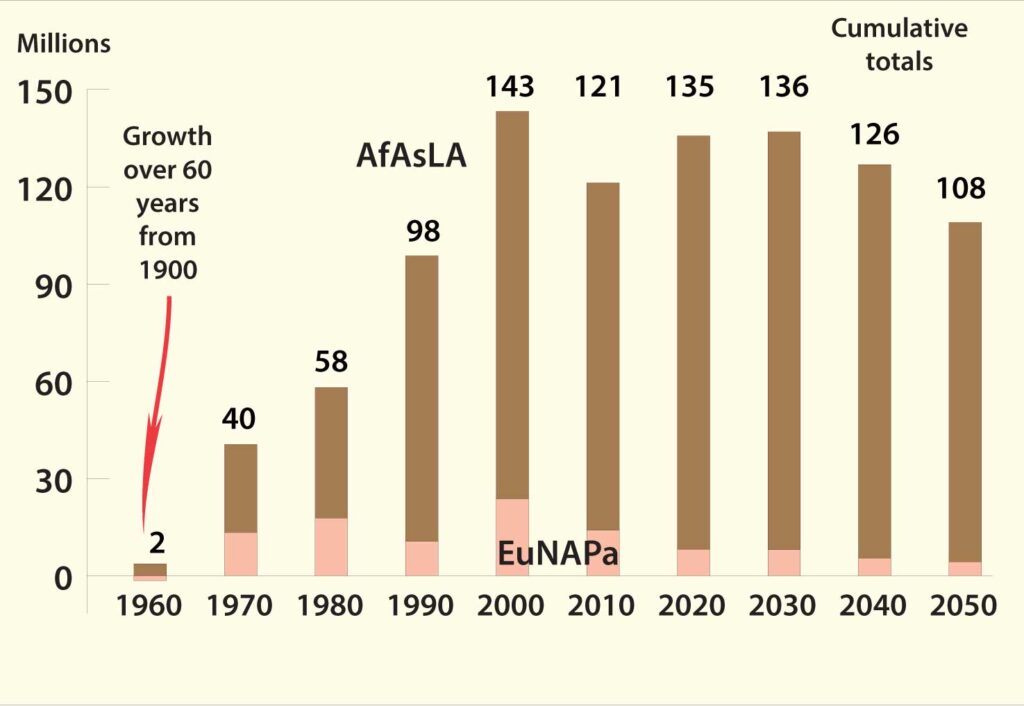
Globalization and the Great Commission
We need to recognize that the patterns for the ministry of churches and missions that have worked reasonably well for 200 years have largely gone for ever. The Great Commission is just as valid today and we still face an unfinished task that should drive us to our knees. We must still obey that last command of Jesus—but how?
We need to look again at the emphases we find in that Commission and apply these to our changed world. The expression ‘go and make disciples of all nations’ is all-too-often distorted in translation because our grammars do not allow for the Greek verb to be translated as a verb. If we do, it becomes ‘in going, disciple all peoples’. This significantly changes the application of this command! Every Christian body should be globally missional, but few are truly so.
- The active ministry is ‘to disciple’, but this is the one thing very few churches or leaders focus on. My life aim has been to have disciples that extend to the fourth generation, as in 2 Timothy 2:2, but this took 60 years of ministry to see it realized.
- ‘In going’ implies that the ‘going’ is assumed for all believers. Discipling should be a fundamental component and purpose of every secular and spiritual activity in ministry.
- ‘All nations’ means discipling both individuals and the social fabric of peoples and nations. It is not just the personal extractions of some out of society. Christians should seek to mould others with (and be moulded by) the kingdom values of honesty, integrity, love, and care for the less fortunate, proclaiming an eternal hope.
Ministry in the Breakdowns of Globalization
Here I can only list key areas and say a few words about what I see as major focal points for planning for future ministry:
- The ravages of war. The wars of the 21st century have left many countries devastated and traumatized. Millions have been slaughtered and many more millions displaced, with whole populations impoverished and starving. Think of Algeria, the six former Yugoslavian nations, Iraq, Afghanistan, Libya, the two Sudans, Yemen, Eritrea/Ethiopia, and Ukraine/Russia, just to name a few. All these will need help for decades to recover. Most of these nations are still largely under-evangelized. Who better to give help than the global network of Christians?
- Migrations. All over the world, the effects of wars, persecutions, and economic stresses have significantly accelerated migration to cities and to other nations. Ministries to migrants will need to be a high priority in Christian ministry with a special emphasis on intentional long-term discipling. Most migrants go to cities if they can, and in their first decade are also more open to receive the Good News. We must not lose that opportunity.
- Economic crises. The breakdown of global supply chains, massive debt levels, and populist nationalisms guarantee serious inflation, multiplied failings, and bankrupt states. A major focus will need to be combining a discipling ministry with door-opening aid projects on limited income that are, as far as possible, self-maintaining and self-propagating. This economic crisis will inevitably mean a lower income and massive rethinking of viable structures and ministries for churches and agencies as giving and membership commitment declines.
- Climate change. There was a brief period in the first 15 years of this millennium where enough of the world’s wealth could have slowed the impact of climate change. Wars, fudging of statistics, greed, and national self-interest make this look unlikely. The effects are likely to further increase the migration of populations from the most exposed areas, especially the African Sahel, Middle East, and Pakistan/Afghanistan. Humankind’s first job description was the stewardship under God of the earth and its inhabitants. It should be in our Christian DNA to care for our world with wise, humane, sensible strategies. It should be part of our missional task to lovingly seek local applications to make for a sustainable future.
- Islam. In 2011 I published this populations map of the Muslim World projected to 2050[5]:
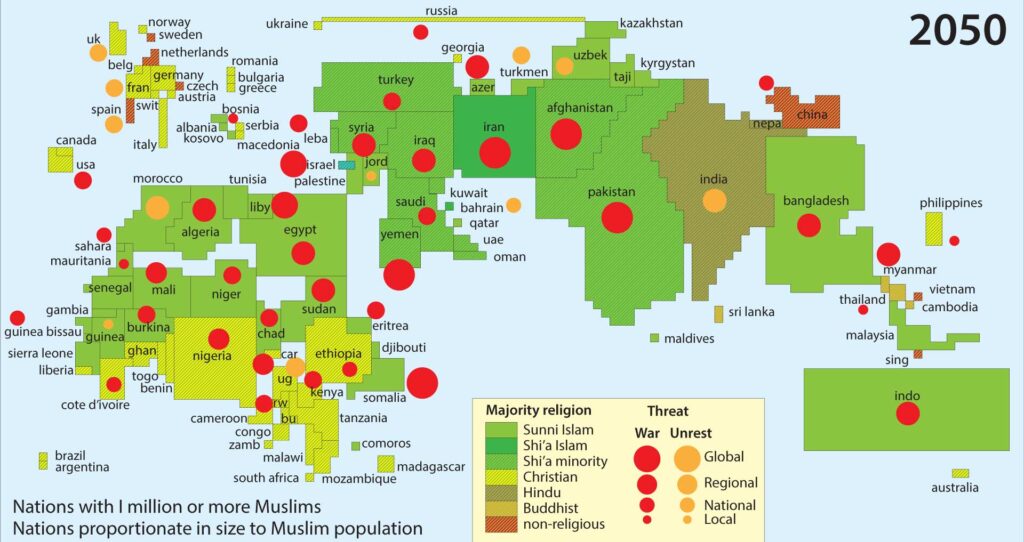
Each country is sized relative to the projected size of its Muslim population and concentrations of the two major branches of Islam: the Sunni and Shi’a. I also indicated which countries would suffer from likely war over the period between 2011 and 2050. It was horrific to realize that scarcely any part of the Muslim world would escape war, mainly between the two branches of Islam and Jihadist movements. Twelve years later, I realize I was too optimistic, so I have somewhat updated the threats. It has been worse with Jihadists bringing war to Mali, Burkina Faso, Niger, and beyond, and also a devastating civil war in Syria.
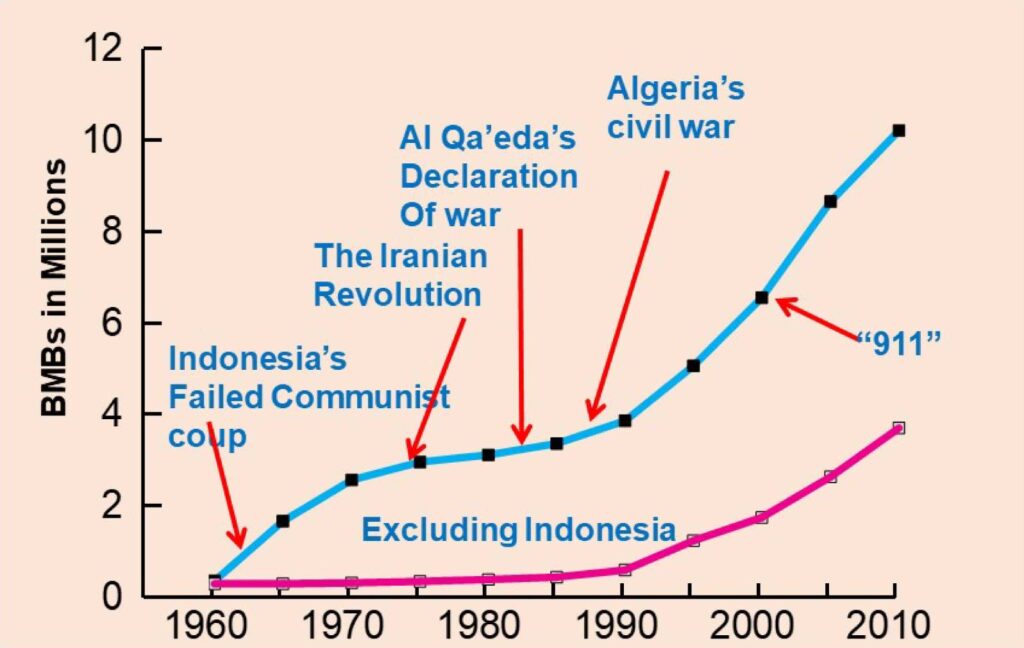
It is not surprising that the majority of all international refugees are Muslim. This turmoil in the Muslim world has brought disillusionment and despair to many Muslims and a new openness to the gospel, with possibly 20 million new followers of the Lord Jesus in Indonesia, Iran, Algeria, and parts of sub-Saharan Africa[6]. This diagram shows the estimated global population of BMBs in 2010. I reckon there were only about 60,000 BMBs in 1960, but some estimate the number for 2022 to be over 20 million. This unique opportunity is now ours to win many more in our times—both among the many refugees and in their homelands.
- Population collapse. At some stage in the next 40 years, the global population will begin to rapidly decline. I think this will be far more rapid than experts predict because of the issues covered here. For more developed nations this is already a serious reality—especially Europe, Russia, and East Asia, where, in some cases, populations may halve in a generation, with huge impact on economic life and resulting in many countries becoming unviable. This will have a major impact on church life, recruitment to ministry, and giving for Christian work. Our missionary candidates will largely dry up, conversion rates will plummet, churches will become bankrupt, and there will be a growing concern for the elderly. How well are we thinking through the implications in our strategies for world evangelization?
- Peoples and language extinctions. The 20th century involved ministry to a world population that was largely rural, with great cultural and linguistic variety. Our ministry emphasis was on identifying peoples and their languages so that we could disciple them and give them the Scriptures in their own languages. This was the great emphasis of many missions and international bodies such as the Lausanne Movement and the AD2000 and Beyond Movement. This will continue for some decades, but with the unstoppable massive migrations to cities and other lands that will dominate the next 50 years, our focus changes to cities where the great majority of the world population lives in the 21st century. Cities are great melting pots of cultures and language. New cultures and languages will emerge that will need to be discipled. The 17,000 people groups of the world speaking nearly 7,000 languages will converge into 250 people clusters, and these into 15 Affinity Blocs that will become a more significant focus in cities. Some postulate that 2,000 languages will die out by 2100. I suspect it will be nearer double that because of the megacity expansions and the internet. Only 39 languages are used as a teaching medium for multiple subjects in the world’s universities, and Google Translate is available in 133 languages—what an advantage these languages have! How will this affect our investment in ministries, deployment of personnel, and structures? We will adapt or die.
Globalization: What Remains?
The Russian invasion effectively sealed the fate of the one political entity that provided a framework for globalization: the United Nations. The UN’s failure to discipline such an act of aggressive genocide by a Security Council member exposed its impotence. There are, however, two major aspects of globalization I foresee as likely to thrive.
The Internet Empire
We will not see the clock put back to the globally compartmented, regional shape of the pre-Reformation world. We cannot stop the global influence of the internet, whatever barriers autocratic regimes may seek to impose. It is here to stay and is pervading every area of human existence. For many of us, that prospect, once viewed as a great boon and source of information, now looks like a terrifying monster spewing porn, fake news, propaganda, and ideologies that divide and destroy. The development of artificial intelligence could threaten the destinies of individuals and nations. The social media empires have, in effect, become an unaccountable global superpower. The advent of COVID-19 hastened us in this direction with Zoom, etc. How do we need to re-tool our ministries and churches to be more impactful in a frenzy of social media distractions to effectively evangelize the netizens of this cyber world?
The Global Church
The other survivor of de-globalization is the living, globalized church. There is no other global body in existence that could effectively bridge every divide of culture, politics, language and geographical boundary to offer a unifying, alternate, heavenly culture that liberates, unites, embraces accountability, and gives hope for the future.
Latin America, Africa, and Asia not only make up the Majority World, but also now have a significant majority within the global church and are often more biblical and evangelistic than their counterparts in the West. Will we prove to be humble and willing to adapt to a very different world and embrace this component of globalization?
As equal partners praying and working together, we are well able to advance to achieve every goal set before us by our Lord Jesus Christ!
Endnotes
- Menzies, Gavin. 1421: The Year China Discovered America (New York, Harper Perennial, 2004). Fascinating book largely rejected by historians, but I believe there is some substance to what he wrote!
- “Refugee Data Finder.” UNHCR. https://www.unhcr.org/refugee-statistics (accessed 2022).
- Carey, William. An Enquiry into the Obligations of Christians to Use Means for the Conversion of the Heathens (Amazon Kindle, 2011).
- Johnstone, Patrick. The Future of the Global Church: History, Trends, and Possibilities (IVP/Authentic, 2011).
- Johnstone, Ibid, 77.
- Miller, Duane Alexander, and Johnstone, Patrick. “Believers in Christ from a Muslim Background: A Global Census.” Interdisciplinary Journal of Research on Religion, vol. 11 (2015).
